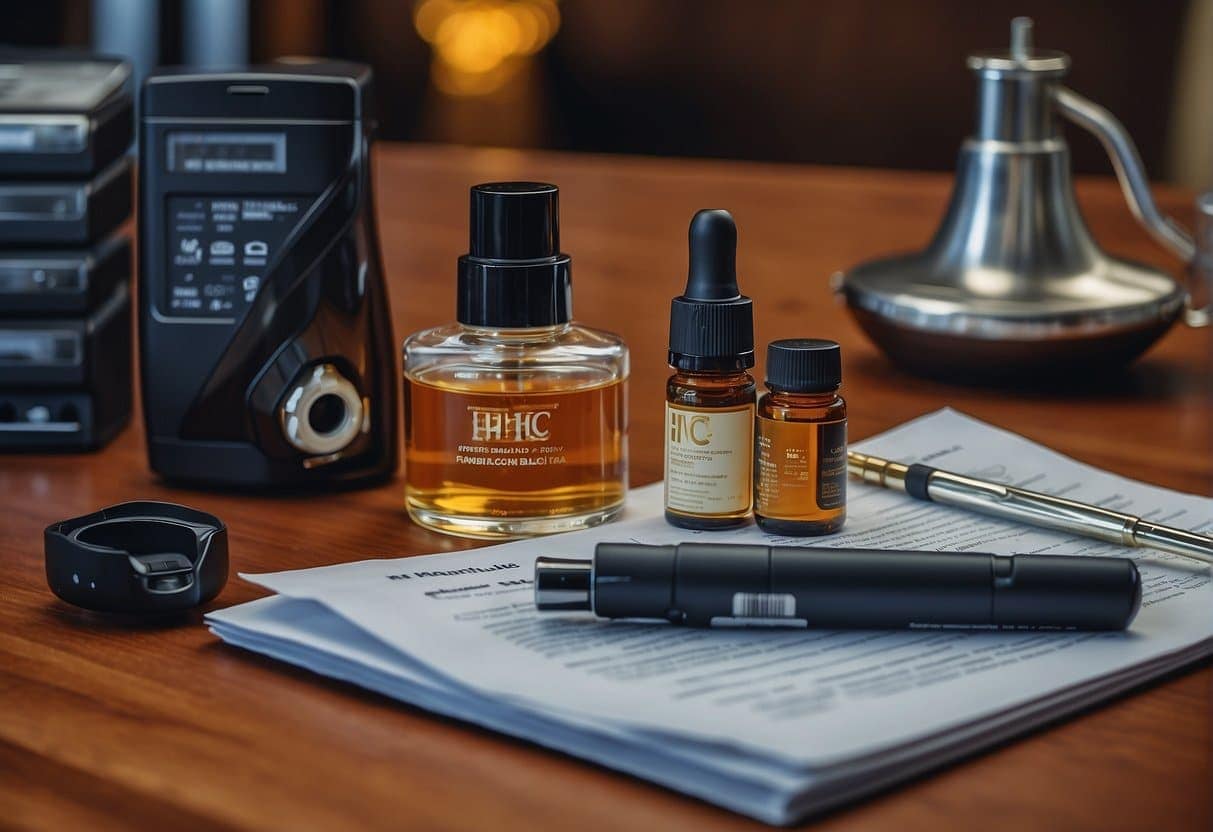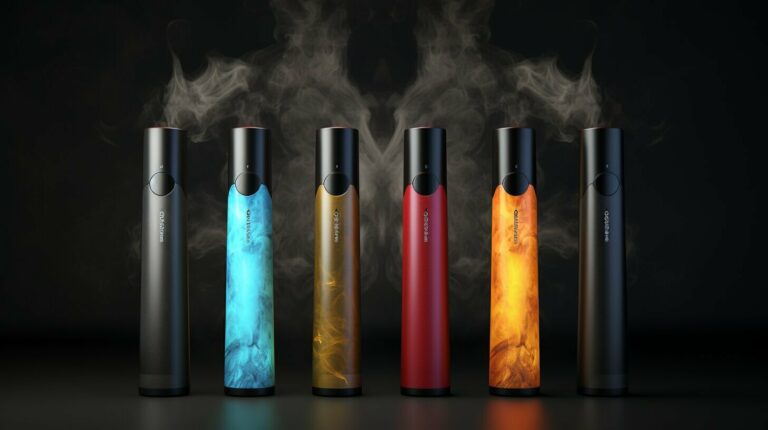Is HHC Safe to Vape? Unpacking the Facts on Inhalation Safety
Diving headfirst into the HHC world, those marvelous vaping must-haves, it’s natural to wonder, Is HHC Safe to Vape? HHC, THC’s cousin, brings its own flair and feel to the table. As the crowd choosing to vape HHC grows, it’s key to grasp how it swings our wellbeing. HHC knows how to jazz up your spirit and senses, riding the same wave as its cannabinoid kin, yet hang tight – the long haul snapshot is still zooming in.
- Understanding HHC
- Legal Status and Regulation
- Health and Safety Considerations
- Vaping HHC
- Product Quality and Manufacturing
- Consumer Considerations
- Effects and Experiences
- Alternatives and Comparisons
- Frequently Asked Questions
- What are potential side effects associated with vaping HHC?
- What distinguishes synthetic cannabinoids from HHC?
- How does HHC compare to natural cannabinoids in regard to safety?
- Are there any benefits associated with using HHC vape products?
- Can using HHC vape products lead to a substantial psychoactive experience?
- Have there been any studies on the long-term effects of using HHC vape?
The safety standards and descriptions of the substances inhaled when vaping are important to consider. Some HHC vaping products have been found to contain unlabeled adulterants and heavy metals, raising concerns about the potential for harm. It’s advisable to approach HHC with caution as the market is not uniformly regulated, and products might not undergo rigorous testing.
Your awareness of what you are vaping is essential—being informed about the contents and quality of your vaping products can help minimize risks. Acknowledging the lack of comprehensive studies, it’s necessary to weigh the known effects of HHC against the unknowns of vaping it. As research catches up with the emerging trends in cannabinoid usage, staying updated with the latest findings will guide you towards making more informed decisions about your health and vaping habits.
Understanding HHC
When exploring the realm of cannabinoids such as HHC, it’s essential for you to have a clear understanding of its chemical nature and how it compares to other more renowned compounds like THC and CBD.
Chemical Structure of HHC
Hexahydrocannabinol (HHC) is a hydrogenated derivative of THC. This means that hydrogen atoms are added to the THC molecule, a process known as hydrogenation, the same process used to convert vegetable oils into margarine. The chemist Roger Adams first synthesized HHC in 1944 by adding hydrogen molecules to Delta-9 THC. This transformation changes the physical structure but not the number of carbon atoms, thus creating a more stable compound that retains similar psychoactive properties.
- Molecular Stability: HHC is more stable than THC due to its chemical structure which is less prone to oxidation. This means it can have a longer shelf life.
- Legality: Often derived from hemp, which is legal under the 2018 Farm Bill, HHC operates in a gray area concerning its legality.
Comparison with THC and CBD
Comparing HHC with its cannabinoid counterparts THC (Delta-9 and Delta-8) and CBD:
| Cannabinoid | Psychoactive | Interaction with Endocannabinoid System | Legality |
|---|---|---|---|
| HHC | Yes | Binds to CB1 and CB2 receptors | Gray area, typically derived from hemp |
| Delta-9 THC | Yes | Binds primarily to CB1 receptors | Federally illegal, but legal in some states |
| Delta-8 THC | Yes, less potent | Binds to CB1 and CB2 receptors | Gray area, often sourced from hemp |
| CBD | No | Interacts with endocannabinoid receptors | Legal if derived from hemp |
- Psychoactive Properties: Like Delta-9 and Delta-8 THC, HHC has psychoactive effects, but the intensity may vary. Your experience with HHC can differ based on the isomer and your body’s endocannabinoid system.
- Regulation: Unlike THC (Delta-9), which is a Schedule I controlled substance, HHC’s legal status isn’t as clear-cut since it is often synthesized from hemp, which is legal.
- Safety Profile: While THC has been widely studied, HHC lacks extensive research to fully understand its safety and effects. Therefore, caution is advised.
The nuances of HHC’s interaction with your endocannabinoid system may mirror those of other cannabinoids but remember that each synthetic cannabinoid, including different isomers of HHC, can affect individuals uniquely.
Legal Status and Regulation

When considering the safety of vaping Hexahydrocannabinol (HHC), it’s important to understand its legal status and how it’s regulated. The evolving landscape of cannabis-related laws directly impacts product availability and safety standards.
The 2018 Farm Bill Impact
The 2018 Farm Bill notably changed the landscape of cannabis legality on a federal level by defining hemp as a cannabis plant containing no more than 0.3% Δ9-tetrahydrocannabinol (THC). This change removed hemp from the Controlled Substances Act, creating a pathway for the legalization of hemp-derived products. However, the legal status of HHC is complex. Its legality may hinge on whether it is synthesized from hemp-derived cannabinoids, which would be federally legal under the Farm Bill, or from other means, which could potentially make it federally illegal. For clarity on HHC, you can refer to Cannabinoids and the challenges of new synthetic derivatives.
State-Specific Legislation
Even with federal law shaped by the 2018 Farm Bill, cannabis-related laws can vary widely from state to state. Some states align closely with federal guidelines, while others have more restrictive or, conversely, more permissive stances regarding the legality of cannabinoids like HHC. When evaluating the legality of HHC, it’s critical to consult your state’s specific legislation. For example, certain states might consider all non-Δ9-THC cannabinoids as legal, while others may have regulatory frameworks that render HHC’s legality ambiguous or outright illegal. It is advised to review the laws pertaining to your state to understand whether HHC is permitted for use in vaping products. This is critical for assessing the safety standards enforced at the state level for these substances.
Health and Safety Considerations

When considering HHC’s safety profile for vaping, it’s important to weigh potential benefits against possible side effects and understand how it could impact drug screenings.
Potential Benefits
- Pain Relief: You may experience pain relief when vaping HHC, as some users report a reduction in discomfort.
- Anxiety and Depression: Anecdotal evidence suggests that HHC could potentially help alleviate symptoms of anxiety and depression, promoting relaxation.
Possible Side Effects
- Increased Heart Rate: One of the most noted side effects you might encounter is an increased heart rate shortly after use.
- Coordination: You might experience reduced coordination and a sensation of lightheadedness, indicating the need to use HHC responsibly.
- Insomnia: Although some find HHC helpful for sleep, others might suffer from insomnia as a side effect, which points to the complexity of its effects on individuals.
Impact on Drug Screening
- HHC and Drug Tests: Be aware that vaping HHC may affect the results of a drug test. Consult with a healthcare professional for guidance tailored to your specific health profile and needs.
Vaping HHC

When considering HHC, or hexahydrocannabinol, particularly when inhaled through vaping, it is essential to understand safety concerns and risk factors. Vaping HHC has grown in popularity due to its ease of use and discretion compared to traditional consumption methods.
Safety and Risks
Your safety is a significant concern when vaping substances like HHC. While HHC vape cartridges offer a convenient and discreet method of inhalation, the long-term effects are not yet fully understood. Some studies suggest that chemicals like vitamin E acetate in vape products could pose health risks. It’s important to be aware of what is in your vape cartridges and ensure they are purchased from reputable sources. Vape devices and e-cigarettes heat substances to create an inhalable vapor, but the safety of heating and inhaling HHC specifically requires further investigation.
Comparing Vaping to Other Consumption Methods
Vaping is one form of HHC consumption that might offer a different experience than edibles like gummies, which undergo metabolism in the digestive system. Unlike oral consumption, vaping introduces HHC directly to your lungs, which may result in a more immediate and potent effect. This means that the effects of vape cartridges can be felt quicker than the THC in edibles. However, while vape carts are convenient, they may also carry unique risks not found with gummies or other edible forms. In the context of drug testing, inhaling HHC through vaping or vaporizers could potentially have implications similar to those of THC, although specific detectability can vary based on the substance and the test used.
Product Quality and Manufacturing

When considering whether HHC is safe to vape, you must scrutinize product quality and manufacturing processes. Ensuring high standards from sourcing to final production is crucial for your safety.
Sourcing and Production
The journey of HHC oil starts with the sourcing of raw materials; premium-grade hemp-derived cannabinoids, including CBD, form the foundation. Quality control is pivotal, beginning with the selection of hemp strains with optimal potency and purity. The production phase employs precise scientific techniques to convert CBD into HHC via a catalyst—commonly metals like palladium or platinum—which should be removed post-reaction to prevent contamination.
Contamination Risks
Contamination poses a serious risk to the safety and quality of HHC products. In the crafting of HHC oils, residual solvents or heavy metals like lead, nickel, or even trace amounts of the catalyst used can profoundly affect the final product. Rigorous testing must follow to detect any chemicals or heavy metal residues that are harmful if inhaled. The consistency of dose in HHC vaping products is another area where precision is non-negotiable to avoid any adverse effects due to improper use.
Consumer Considerations
When it comes to vaping HHC (hexahydrocannabinol), you need to make informed choices about dosage and product quality to ensure a safe experience. These factors are crucial due to the varying potencies and regulatory status of hemp-derived cannabinoids.
Determining Proper Dosage
The appropriate dose of HHC can vary widely based on your experience with cannabinoids and the desired effects. Given that HHC is a newer cannabinoid on the market, less is known about its pharmacological profile compared to delta-8 THC or delta-10 THC. When vaping, start with a low potency and monitor how you feel, as the effects can differ from ingesting gummies or tinctures. It’s important to be aware that some users report effects like dry mouth, and HHC’s conversion to 11-hydroxy-THC in the body can potentially result in a more intense experience.
Selecting Quality Products
When selecting vaping products, always opt for reputable sources that provide comprehensive safety data and ingredient transparency. Hemp-derived cannabinoids come in various forms such as vape cartridges, gummies, and tinctures. Look for products with clear labeling of cannabinoid content and whether they are derived from cannabis plants or hemp plant extract. Since the market is less regulated, confirming the absence of harmful contaminants is critical. Always ensure that the product is compliant with legal standards, and avoid those that lack evidence of third-party testing. High-quality, safe HHC products should ideally provide information regarding potency levels, whether they are high-potency or low-potency, to help you make an informed decision about dosing.
Remember that while HHC might be marketed as a legal alternative to other cannabinoids, its effects and safety profile are not fully understood yet. Exercise caution and consult with a healthcare provider if needed.
Effects and Experiences

When considering vaping hexahydrocannabinol (HHC), it’s important to analyze both the psychoactive impact and various physical and psychological reactions. Knowing these can help you make an informed decision about its use.
Psychoactive Impact
HHC is a psychoactive compound that may induce effects similar to those associated with Delta 9 THC, though it is typically derived from hemp and is structurally different. The psychoactive effects can range from mild to significant, and while some users report an elevated mood and possible pain relief, there is potential for experiencing anxiety or paranoia, especially with higher doses. It’s also possible that prolonged use could lead to increased tolerance, necessitating larger quantities to achieve the same effects.
Physical and Psychological Reactions
The side effects of HHC are not fully understood due to its relatively recent introduction to the market. However, users have reported various physical and psychological reactions, such as confusion, red eyes, and in some cases, altered coordination which could affect daily activities. There may also be an increased heart rate and feelings of depression or anxiety in certain individuals. While some seek HHC for potential pain relief or for its sedative properties, which might alleviate insomnia, it’s crucial to be aware of the possibility of experiencing these adverse reactions as well. It’s also worth noting that the experience can vary greatly from person to person.
Alternatives and Comparisons
When evaluating the safety of HHC (hexahydrocannabinol) for vaping, it’s essential to consider its profile in contrast to other cannabinoids and the range of available cannabis-related products, including their potential medical benefits and psychoactive effects.
HHC vs. Other Cannabinoids
HHC is a semi-synthetic cannabinoid often compared to its closely related compounds like THC (tetrahydrocannabinol) and CBD (cannabidiol). Unlike CBD, which is known to be non-psychoactive, both HHC and THC induce psychoactive effects, though the intensity and duration may vary. THC is the principal psychoactive component in cannabis, with extensive research backing its medical benefits, including potential uses in breast cancer management.
CBD, as an alternative, is renowned for its therapeutic potential, without the high associated with THC, making it a preferred option for those seeking relief without psychoactivity. For those interested in HHC, it’s crucial to be aware that the safety profile of this cannabinoid isn’t as well-studied, and therefore careful consideration should be given to the risks versus the desired effects.
- Psychoactivity: THC > HHC > CBD
- Research Data Available: CBD > THC > HHC
- Legal Status Varies: THC and HHC are regulated more stringently than CBD
Choosing Between HHC and Other Products
You have a diverse array of product choices ranging from gummies and edibles to concentrates and HHC flower. Edibles, like gummies, provide a discreet and easy-to-dose alternative but involve a delayed onset of effects. Vape products, on the other hand, offer a rapid onset but with heightened concern over inhalation safety, particularly with compounds like HHC where research is more limited. If you prioritize a non-psychoactive experience, CBD-based products will be your go-to option.
Concentrates containing THC are known for their potency and swift effect, yet require careful handling due to the high levels of psychoactivity. HHC flower and vape products might appeal to you if you’re exploring beyond traditional cannabis options, yet it is advised to approach these newer, less-researched products with caution.
- Product Choices:
- Edibles (Gummies, etc.): Discreet, controlled dosing
- Vapes (HHC, THC): Rapid onset, variable safety
- Concentrates (THC-rich): High potency, immediate effect
- HHC Flower: Novel experience, less data available
When considering vaping HHC, reflect on the current knowledge gaps and compare them with the established profiles of THC and CBD. Your decision should align with your preferences for medical benefits, desire for psychoactivity, and your assessment of the risks involved.
Frequently Asked Questions
In this section, you’ll find detailed responses to common queries regarding the safety and effects of vaping Hexahydrocannabinol (HHC).
What are potential side effects associated with vaping HHC?
Although research on HHC is relatively new and limited, side effects might include dry mouth, changes in appetite, and altered sensory perception. User reports indicate experiences similar to those associated with THC, including potential short-term cognitive and motor impairments.
What distinguishes synthetic cannabinoids from HHC?
HHC is not a synthetic cannabinoid; it occurs naturally in hemp plants, albeit in small quantities. Synthetic cannabinoids, on the other hand, are man-made chemicals designed to interact with the same receptors as THC but can have unpredictable and severe effects.
How does HHC compare to natural cannabinoids in regard to safety?
The safety profile of HHC is not as well established as natural cannabinoids like THC and CBD. Since HHC is semi-synthetic and requires laboratory processes to be produced in viable quantities, there’s a need for more comprehensive studies.
Are there any benefits associated with using HHC vape products?
Some users of HHC vape products report benefits similar to those of THC, including relaxation and a euphoric feeling, without the presence of THC itself, which may be preferable in regions where THC is illegal.
Can using HHC vape products lead to a substantial psychoactive experience?
Yes, using HHC vape products can lead to a psychoactive experience, sometimes described as being between the effects of delta-8 and delta-9 THC. The intensity of the experience varies based on dosage and individual tolerance.
Have there been any studies on the long-term effects of using HHC vape?
No substantial long-term studies have been conducted on HHC, so the long-term effects of using HHC vape are currently not well understood. Users should approach use with caution and look for products from reputable sources that have undergone lab testing.







